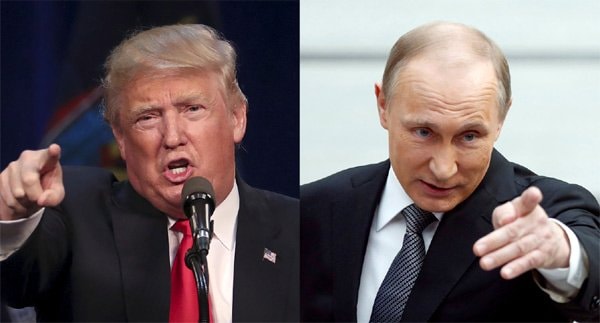Are the US and Russia about to enter a Cold War?
The expulsion of Russian diplomats from the US and many other countries in Europe once again raises the question of whether the world is returning to the Cold War?
On March 26, the US announced the expulsion of dozens of Russian diplomats over accusations that Moscow poisoned former Russian spy Sergei Skripal on British soil.
Accordingly, President Donald Trump signed an order to expel 60 Russian diplomats and close the Russian consulate in Seattle, Washington state.
This includes 48 diplomats working at the Russian embassy and 12 diplomats at the Russian mission to the United Nations in New York. They and their families must leave the US within 7 days.
|
| US President Donald Trump (left) and his Russian counterpart Vladimir Putin. |
Last week, London kicked off a wave of sanctions against Moscow by expelling 23 Russian diplomats. As of March 26, at least 17 countries in Europe and North America had followed suit, the largest expulsion since the height of the Cold War.
The Kremlin spokesman immediately warned that Russia would respond. Moscow affirmed that it had no involvement in the Skripal case.
According to the BBC, there are many concerns that a serious diplomatic crisis and a freeze in relations between Moscow and the West, if it happens, will once again plunge the world into the Cold War.
The Cold War is a term used to describe the tense relationship between the United States and the Soviet Union from 1945 to 1989. At that time, neither side fought directly for fear of nuclear war, the consequences of which were so terrible that neither side dared to think about compensation.
Historians therefore see the Cold War as a battle between two opposing systems of government. Both sides had different ideas about how to run a country, and both believed their own systems were superior. Both sides formed broad alliances, with the United States and the West forming NATO and the Soviet Union forming the Warsaw Pact with Eastern European countries like Poland and Hungary. Both sides were wary of each other, so they began rapidly building and stockpiling weapons.
By the 1960s, the United States and the Soviet Union could launch missiles across continents at high speeds. By the end of the decade, both sides were developing anti-ballistic missile systems to defend themselves. Nuclear war also nearly occurred after the Cuban Missile Crisis of 1962. Several proxy wars followed.
"The Cold War was never really cold. Millions died in proxy wars or conflicts that superpower competition imposed without any recognition of the local nature of the conflict," BBC quoted Malcolm Craig, senior lecturer in American history at Liverpool John Moores University.
Nowadays, the expulsion of Russian diplomats makes many people immediately think of the Cold War and fear that the world will once again witness a fierce confrontation between Russia and the West?
However, analysts say this scenario is unlikely to happen, even though the situation is not easy to predict. In reality, there are many fundamental differences between the former Soviet Union and modern Russia today.
"Russia is no longer the Soviet Union, and its international position is quite different. Russia today is much more closely integrated into the global economic system, so it is more vulnerable to economic pressure," BBC quoted Malcolm Craig as saying.
"I don't think Putin wants a long freeze in relations and more sanctions," commented Michael Cox, Emeritus Professor of International Relations at the London School of Economics.
But Mr Cox warns that the current tensions are very unpredictable. "One thing the Cold War did, at least until 1989, was keep the two sides at a fairly good distance from each other. There was a kind of tolerance of influence. Now the lines of demarcation seem to have completely broken down," he adds.



